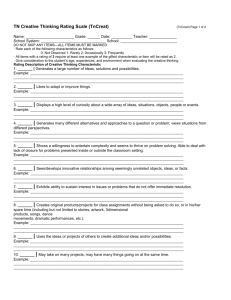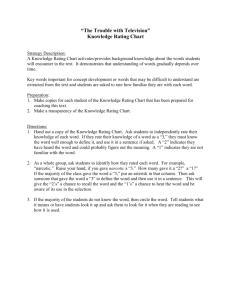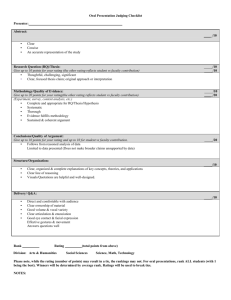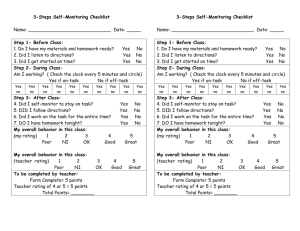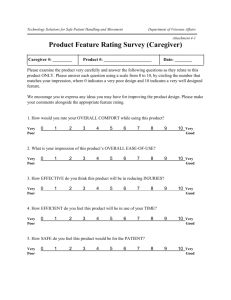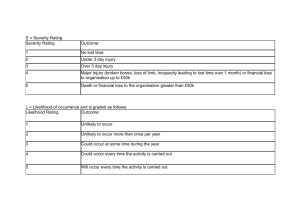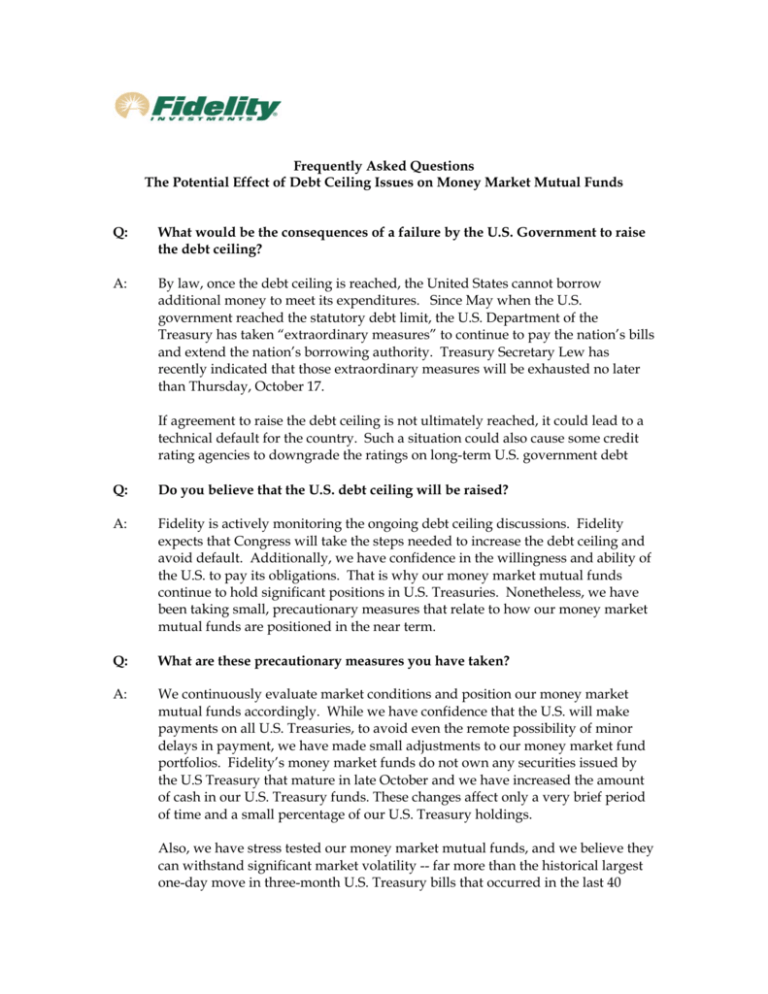
Frequently Asked Questions
The Potential Effect of Debt Ceiling Issues on Money Market Mutual Funds
Q:
What would be the consequences of a failure by the U.S. Government to raise
the debt ceiling?
A:
By law, once the debt ceiling is reached, the United States cannot borrow
additional money to meet its expenditures. Since May when the U.S.
government reached the statutory debt limit, the U.S. Department of the
Treasury has taken “extraordinary measures” to continue to pay the nation’s bills
and extend the nation’s borrowing authority. Treasury Secretary Lew has
recently indicated that those extraordinary measures will be exhausted no later
than Thursday, October 17.
If agreement to raise the debt ceiling is not ultimately reached, it could lead to a
technical default for the country. Such a situation could also cause some credit
rating agencies to downgrade the ratings on long-term U.S. government debt
Q:
Do you believe that the U.S. debt ceiling will be raised?
A:
Fidelity is actively monitoring the ongoing debt ceiling discussions. Fidelity
expects that Congress will take the steps needed to increase the debt ceiling and
avoid default. Additionally, we have confidence in the willingness and ability of
the U.S. to pay its obligations. That is why our money market mutual funds
continue to hold significant positions in U.S. Treasuries. Nonetheless, we have
been taking small, precautionary measures that relate to how our money market
mutual funds are positioned in the near term.
Q:
What are these precautionary measures you have taken?
A:
We continuously evaluate market conditions and position our money market
mutual funds accordingly. While we have confidence that the U.S. will make
payments on all U.S. Treasuries, to avoid even the remote possibility of minor
delays in payment, we have made small adjustments to our money market fund
portfolios. Fidelity’s money market funds do not own any securities issued by
the U.S Treasury that mature in late October and we have increased the amount
of cash in our U.S. Treasury funds. These changes affect only a very brief period
of time and a small percentage of our U.S. Treasury holdings.
Also, we have stress tested our money market mutual funds, and we believe they
can withstand significant market volatility -- far more than the historical largest
one-day move in three-month U.S. Treasury bills that occurred in the last 40
years. Stress testing is an ongoing process, which we review and update as part
of our portfolio management strategies. In those tests, we take into account a
variety of potential market scenarios and outcomes.
Q:
Are the long-term ratings of the U.S. in jeopardy?
A:
One or more of the credit rating agencies may downgrade its long-term rating of
the U.S. If the long-term rating of the U.S. were to be downgraded, money
market mutual funds would not be required to sell their government securities.
Q:
If the credit rating agencies downgrade the long-term rating would they also
downgrade the short-term rating?
A:
The U.S. Treasury has the highest short-term credit rating from all major credit
rating agencies. Even if the long-term rating were downgraded, we do not
expect a downgrade of the short-term rating. Moreover, a downgrade of the
short-term rating from the highest category to the second highest category would
have no impact on a money market mutual fund’s ability to hold or purchase U.S.
Government securities under the rules that govern money market funds.
Some money market mutual funds are also rated by the credit rating agencies. In
the event that a credit rating agency downgraded the short-term rating of the
U.S., the ratings of money market mutual funds that are rated by that particular
credit rating agency may be also lowered.
Q:
What would occur if the U.S. Government were to default?
A:
If a money market mutual fund held securities on which the U.S. Treasury
defaulted on the payment of interest or principal, then the fund would need to
sell those defaulted securities, unless the fund’s board of trustees determines that
disposing of the securities would not be in the best interests of the fund. The
board may consider market conditions, among other factors, in making that
decision.
Q:
If the U.S. is downgraded or defaults on certain of its debt obligations, will
Fidelity's money market mutual funds be able to hold repurchase agreements
collateralized by U.S. Government securities?
A:
Yes, Fidelity’s money market funds would be able to continue to hold repurchase
agreements (repos) collateralized by U.S. Government securities. In addition, the
funds have the right to require their repurchase agreement counterparties to post
additional collaterali.
Q:
Is my Fidelity money market fund investment safe?
A:
We can state unequivocally that Fidelity’s money market funds and accounts
continue to provide security and safety for our customers’ cash investments.
Our funds invest in money market securities of high quality, and our customers
have full access to their investments anytime they wish. Most importantly, we
have been vigilant in keeping our money market funds safe and in protecting the
$1.00 net asset value (NAV), which has always been our No.1 objective in
managing these funds.
###
Past performance is not a guarantee of future results. Current and future portfolio
holdings are subject to risk.
Investment decisions should be based on an individual’s own goals, time horizon and
tolerance for risk.
An investment in a money market fund is not insured or guaranteed by the Federal
Deposit Insurance Corporation or any other government agency. Although the fund
seeks to preserve the value of your investment at $1.00 per share, it is possible to lose
money by investing in the fund.
Before investing in any mutual funds, please carefully consider the investment
objectives, risks, charges and expenses. For this and other information, call or write
Fidelity for a free prospectus or, if available, a summary prospectus. Please read it
carefully before you invest.
Fidelity Brokerage Services LLC, Member NYSE, SIPC
900 Salem Street, Smithfield, RI 02917
Fidelity Investments Institutional Services Company, Inc.,
100 Salem Street, Smithfield, RI 02917
National Financial Services LLC, Member NYSE, SIPC,
200 Seaport Boulevard, Boston, MA 02110
665416.2.0
© 2013 FMR LLC. All rights reserved.
i
A repurchase agreement is an agreement to buy a security at one price and a simultaneous agreement to
sell it back at an agreed-upon price. On the termination (repurchase) date, the seller repurchases the asset
and pays interest for the use of the buyer’s funds. As protection against the risk that the seller will not fulfill
its obligation to repurchase the securities, the financial asset is held as collateral in a separate account at the
custodian bank and priced daily (marked to market) to maintain a value at least equal to the repurchase
price (which includes accrued interest).

